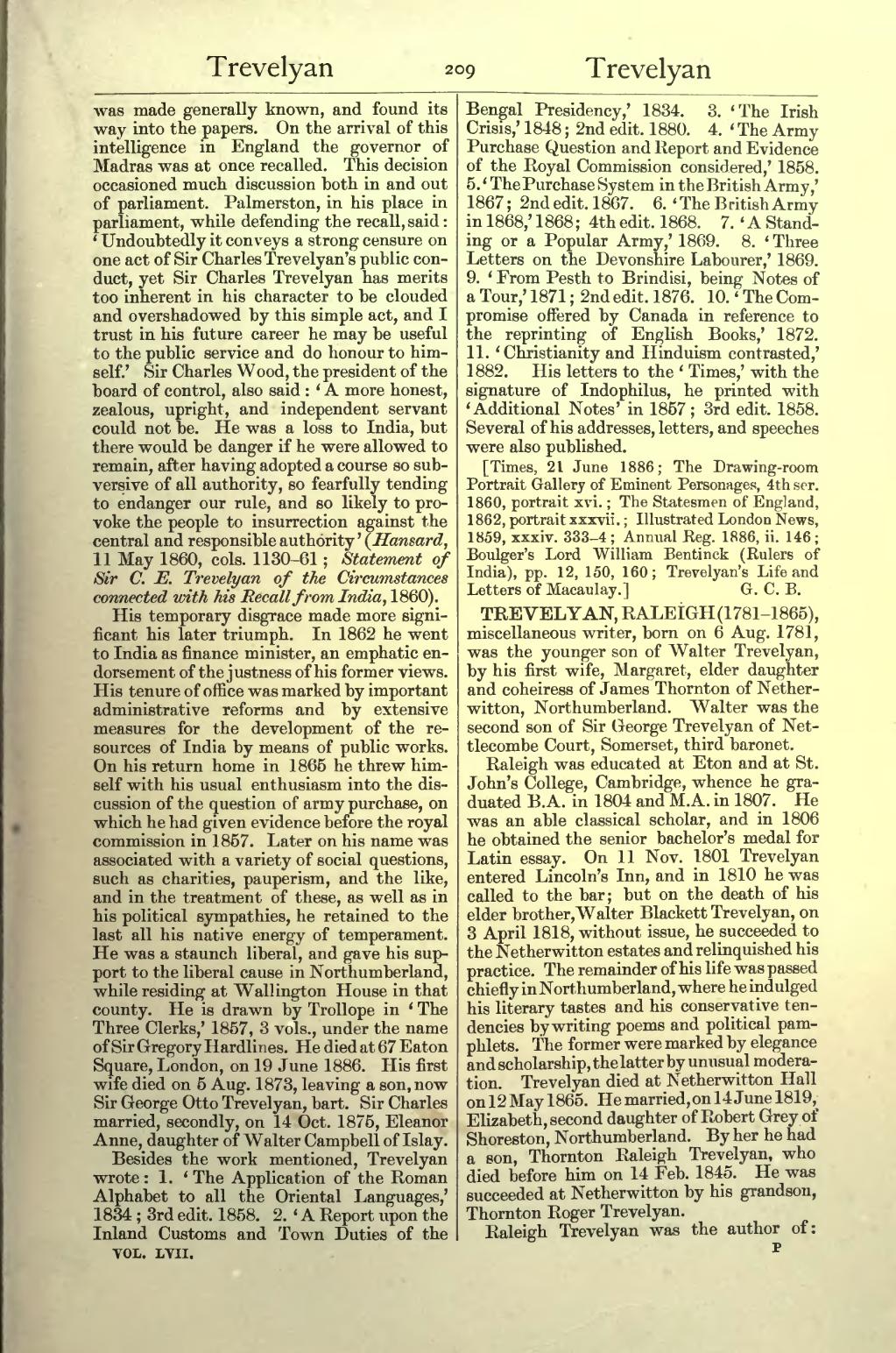was made generally known, and found its way into the papers. On the arrival of this intelligence in England the governor of Madras was at once recalled. This decision occasioned much discussion both in and out of parliament. Palmerston, in his place in parliament, while defending the recall, said: ‘Undoubtedly it conveys a strong censure on one act of Sir Charles Trevelyan's public conduct, yet Sir Charles Trevelyan has merits too inherent in his character to be clouded and overshadowed by this simple act, and I trust in his future career he may be useful to the public service and do honour to himself.’ Sir Charles Wood, the president of the board of control, also said: ‘A more honest, zealous, upright, and independent servant could not be. He was a loss to India, but there would be danger if he were allowed to remain, after having adopted a course so subversive of all authority, so fearfully tending to endanger our rule, and so likely to provoke the people to insurrection against the central and responsible authority’ (Hansard, 11 May 1860, cols. 1130–61; Statement of Sir C. E. Trevelyan of the Circumstances connected with his Recall from India, 1860).
His temporary disgrace made more significant his later triumph. In 1862 he went to India as finance minister, an emphatic endorsement of the justness of his former views. His tenure of office was marked by important administrative reforms and by extensive measures for the development of the resources of India by means of public works. On his return home in 1865 he threw himself with his usual enthusiasm into the discussion of the question of army purchase, on which he had given evidence before the royal commission in 1857. Later on his name was associated with a variety of social questions, such as charities, pauperism, and the like, and in the treatment of these, as well as in his political sympathies, he retained to the last all his native energy of temperament. He was a staunch liberal, and gave his support to the liberal cause in Northumberland, while residing at Wallington House in that county. He is drawn by Trollope in ‘The Three Clerks,’ 1857, 3 vols., under the name of Sir Gregory Hardlines. He died at 67 Eaton Square, London, on 19 June 1886. His first wife died on 5 Aug. 1873, leaving a son, now Sir George Otto Trevelyan, bart. Sir Charles married, secondly, on 14 Oct. 1875, Eleanor Anne, daughter of Walter Campbell of Islay.
Besides the work mentioned, Trevelyan wrote: 1. ‘The Application of the Roman Alphabet to all the Oriental Languages,’ 1834; 3rd edit. 1858. 2. ‘A Report upon the Inland Customs and Town Duties of the Bengal Presidency,’ 1834. 3. ‘The Irish Crisis,’ 1848; 2nd edit. 1880. 4. ‘The Army Purchase Question and Report and Evidence of the Royal Commission considered,’ 1858. 5. ‘The Purchase System in the British Army,’ 1867; 2nd edit. 1867. 6. ‘The British Army in 1868,’ 1868; 4th edit. 1868. 7. ‘A Standing or a Popular Army,’ 1869. 8. ‘Three Letters on the Devonshire Labourer,’ 1869. 9. ‘From Pesth to Brindisi, being Notes of a Tour,’ 1871; 2nd edit. 1876. 10. ‘The Compromise offered by Canada in reference to the reprinting of English Books,’ 1872. 11. ‘Christianity and Hinduism contrasted,’ 1882. His letters to the ‘Times,’ with the signature of Indophilus, he printed with ‘Additional Notes’ in 1857; 3rd edit. 1858. Several of his addresses, letters, and speeches were also published.
[Times, 21 June 1886; The Drawing-room Portrait Gallery of Eminent Personages, 4th ser. 1860, portrait xvi.; The Statesmen of England, 1862, portrait xxxvii.; Illustrated London News, 1859, xxxiv. 333–4; Annual Reg. 1886, ii. 146; Boulger's Lord William Bentinck (Rulers of India), pp. 12, 150, 160; Trevelyan's Life and Letters of Macaulay.]
TREVELYAN, RALEIGH (1781–1865), miscellaneous writer, born on 6 Aug. 1781, was the younger son of Walter Trevelyan, by his first wife, Margaret, elder daughter and coheiress of James Thornton of Netherwitton, Northumberland. Walter was the second son of Sir George Trevelyan of Nettlecombe Court, Somerset, third baronet.
Raleigh was educated at Eton and at St. John's College, Cambridge, whence he graduated B.A. in 1804 and M.A. in 1807. He was an able classical scholar, and in 1806 he obtained the senior bachelor's medal for Latin essay. On 11 Nov. 1801 Trevelyan entered Lincoln's Inn, and in 1810 he was called to the bar; but on the death of his elder brother, Walter Blackett Trevelyan, on 3 April 1818, without issue, he succeeded to the Netherwitton estates and relinquished his practice. The remainder of his life was passed chiefly in Northumberland, where he indulged his literary tastes and his conservative tendencies by writing poems and political pamphlets. The former were marked by elegance and scholarship, the latter by unusual moderation. Trevelyan died at Netherwitton Hall on 12 May 1865. He married, on 14 June 1819, Elizabeth, second daughter of Robert Grey of Shoreston, Northumberland. By her he had a son, Thornton Raleigh Trevelyan, who died before him on 14 Feb. 1845. He was succeeded at Netherwitton by his grandson, Thornton Roger Trevelyan.
Raleigh Trevelyan was the author of:
